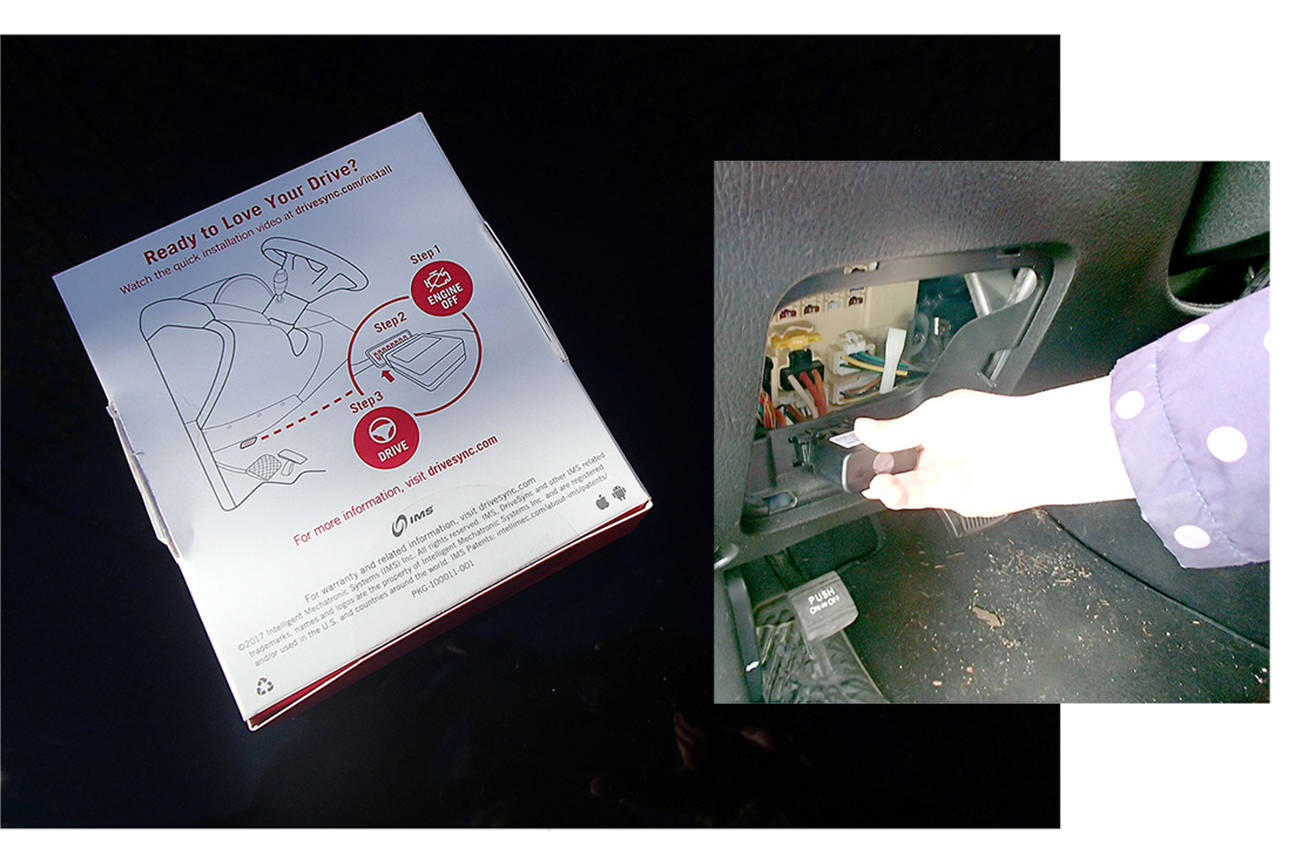I am one of 210 drivers from Snohomish County and 2,000 statewide taking part in the state’s yearlong “road usage charge” pilot project, which will test various ways to levy pay-per-mile taxes.
So far, my 7-year-old has done all the hands-on work.
(But if she were to write this column, it’d be a bunch of ciphers about pirates. So you’re stuck with me.)
There are several methods the state is testing for tracking miles and charging for them. I picked one of the Big Brother options. The GPS-tracking device will allow me to confirm that our trips to Oregon and Idaho — and grandma’s private road — are filtered out of the state’s virtual math.
It’s also a plug-and-play method that requires virtually zero follow-up, and no smartphone is required. If I want to, I can ignore this whole pilot program thing completely. (But I have a column to write.)
We got the bulky little device in the mail, and the second-grader plugged it into our car’s diagnostic port near the steering column.
It took all of about two seconds, meaning my effort to capture a photo focused more on my dirty car mat than the actual installation. (Hey, now there’s a chore idea for the kid.)
Since then, the blinky little box has silently tracked our movements.
At last count, I had driven 311.8 miles and “paid” $8.38 in pay-per-mile taxes for that privilege. The simulation also shows an $8.63 credit to account for the estimated amount I’d already forked over in state gas taxes at the pump.
Pay-per-mile taxes are being pitched as an eventual replacement for that gas tax.
“And I want to use the word ‘replacement,’” stressed state Rep. Judy Clibborn, D-Mercer Island, who chairs the House Transportation Committee.
Clibborn was one of four state lawmakers to speak at a recent press briefing about the pilot project, and she was the most insistent in trying to assure a skeptical public that gas taxes really would go away if pay-per-mile taxes move ahead — or at least that it’s the group’s intention.
Then again, Clibborn is retiring this year from the Legislature. She noted the others are not. “I will hold their feet to the fire,” she said.
Sen. Steve Hobbs, D-Lake Stevens, is one of those. Along with being on the steering committee for the pilot project, he is chairman of the Senate Transportation Committee and will be tasked with helping decide its fate.
“A constitutional amendment, I think, is a must if we move forward,” Hobbs said.
The state Constitution’s 74-year-old 18th amendment ensures gas taxes go to a dedicated fund for road projects. Hobbs said pay-per-mile taxes should be treated the same way.
But with a two-thirds “yes” vote needed in both chambers, he left open the possibility for discussion about whether other transportation projects would be allowed to draw from the pot that they currently are not — namely, transit.
The pilot project, though, is about answering a whole host of other questions.
“Now it’s time to test-drive the program to get answers to those questions,” said Janet Ray, of AAA Washington.
Options for those test drives include no-tech to high-tech methods, from buying a “mileage permit” based on your estimate of how many miles you will drive (only 1 percent chose that) to a smartphone app that not only tracks your miles but tells you how often you speed, brake too hard or exhibit other nasty driving habits (15 percent of drivers picked that one).
“It sort of gamifies it a bit,” said Washington State Transportation Commission Reema Griffith of the smartphone option, which she’s helping test. “My husband I will look at each other and say, ‘Oh, what did you get?’”
In a real-world scenario, such “value-added” services — which also include help finding your car in a parking lot — would be paid directly to vendors and could, in turn, save the state money on overhead.
The state does not track specifically where drivers go, and the companies it’s using aren’t allowed to either.
“We’re not tracking where they’re sleeping, where they’re going to work, any of those things,” said Joe Fuller, president and chief technology officer of Georgia-based Vehcon, one of three outside vendors involved in the pilot project.
The GPS and smartphone extras are “not for everybody,” Griffith acknowledged. “Choice is going to be important. It’s not a one-size-fits-all.”
Hobbs said he is excited to see the pilot project move forward.
“It’s going to bring in a wealth of data so that when the time comes in the future, we will have a policy that works for all Washingtonians,” he said.
Others are not so sure.
“I’m here very much as a skeptic,” said Rep. Ed Orcutt, R-Kalama, ranking minority member on the House Transportation Committee.
And the pilot project won’t answer every question, he added. Is driving a mile on a rural road the same as driving a mile on the Highway 520 floating bridge?
Hobbs urges patience.
“This is a step forward in a long journey,” Hobbs said.
Melissa Slager: streetsmarts@heraldnet.com, 425-339-3432.
Talk to us
> Give us your news tips.
> Send us a letter to the editor.
> More Herald contact information.

























